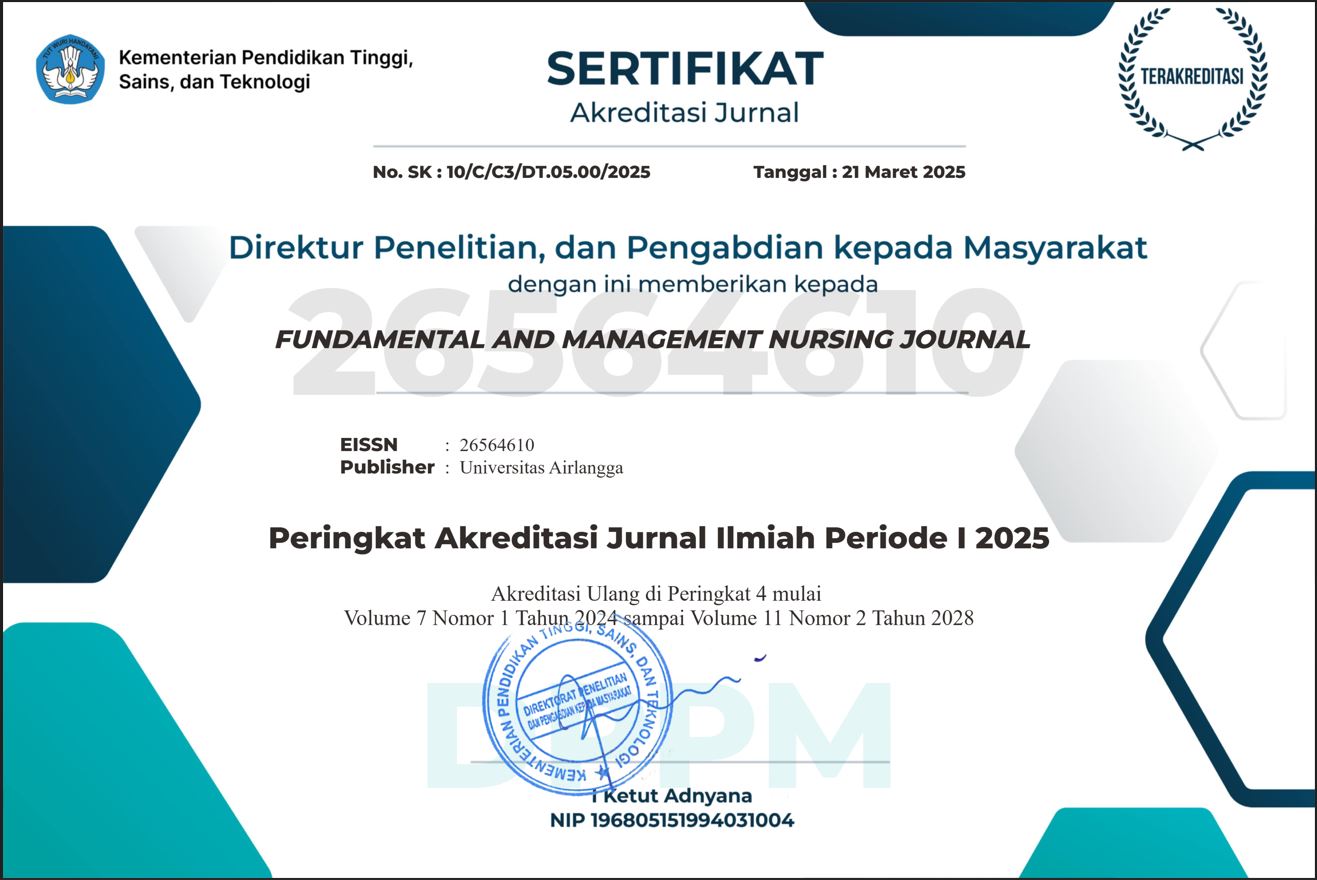Factors Affecting the Implementation of Nursing Round
Downloads
Introduction: Introduction: Nursing rounds aimed to solve patient nursing problems performed by nurses and patients to discuss and implement of nursing care. The implementation of the nursing round can be influenced by knowledge, attitudes, subjective norms, and intentions. The purpose of this study was to determine the factors that influence the nursing round in the Inpatient Room of Bajawa Hospital.
Method: The design of this study was cross-sectional. The total population were 108 and obtainned 98 respondents by total sampling. Independent variables were knowledge, attitudes, subjective norms, and intentions. The dependent variable was the implementation of the nursing round. The instrument used a questionnaire. Data was analyzed by Spearmen's Rho.
Result: Dominant factor on implementation of nursing round was intention (p=0.007). There was a relationship between knowledge and attitude (p=0.000), knowledge with subjective norms (p=0.000), attitudes with intentions (p=0.004), subjective norms with intentions (p=0.002), intention with nursing rounds (p=0.030).
Conclussion: The implementation of the nursing round will run well with good knowledge, positive attitude, good subjective norms, and good intentions from the nurse to carry out the nursing round. So that training in nursing rounds is needed and the implementation of nursing rounds should be regular and continuous.
Abela-Dimech, F. and Vuksic, O. (2018) ‘Improving the practice of handover for psychiatric inpatient nursing staff', Archives of Psychiatric Nursing. W.B. Saunders. doi: 10.1016/J.APNU.2018.04.004.
Agustina, V., Agustian, D. and Ibrahim, F. (2016) ‘Hubungan Tingkat Pengetahuan dengan Sikap Perawat dalam Pelaksanaan Ronde Keperawatan di Ruang Aster dan ICCU RSUD dr. Doris Sylvanus', Dinamika Kesehatan, 7(1).
Ajzen, I. (1991) ‘The Theory of Planned Behavior', Orgnizational Behavior and Human Decision Processes, 50(2), pp. 179–211. doi: 10.1016/0749-5978(91)90020-T.
Ajzen, I. (2005) Attitudes, Personality and Behavior. 2nd edn. New York: Open University Press.
Binka, C. et al. (2018) ‘"I always tried to forget about the condition and pretend I was healed”: coping with cervical cancer in rural Ghana', BMC Palliative Care, 17(1), p. 24. doi: 10.1186/s12904-018-0277-5.
Fabry, D. (2015) ‘Hourly rounding: Perspectives and perceptions of the frontline nursing staff', Journal of Nursing Management, 23(2), pp. 200–210. doi: 10.1111/jonm.12114.
Haigh, R. et al. (2016) ‘Development and implementation of nursing grand rounds in a cancer centre', Cancer Nursing Practice (2014+), 15(5), p. 24. doi: http://dx.doi.org/10.7748/cnp.15.5.24.s22.
Hendra, A. (2008) Faktor-Faktor Yang Mempengaruhi Pengetahuan. Jakarta: Pustaka Sinar Harapan.
Jennings, F. L. and Mitchell, M. (2017) ‘Intensive care nurses' perceptions of Inter Specialty Trauma Nursing Rounds to improve trauma patient care”A quality improvement project', Intensive and Critical Care Nursing. Elsevier Ltd, 40, pp. 35–43. doi: 10.1016/j.iccn.2017.01.002.
Mahanes, D., Quatrara, B. D. and Shaw, K. D. (2013) ‘APN-led nursing rounds: An emphasis on evidence-based nursing care', Intensive and Critical Care Nursing. Elsevier Ltd, 29(5), pp. 256–260. doi: 10.1016/j.iccn.2013.03.004.
Negarandeh, R., Hooshmand Bahabadi, A. and Aliheydari Mamaghani, J. (2014) ‘Impact of regular nursing rounds on patient satisfaction with nursing care', Asian Nursing Research. Elsevier, 8(4), pp. 282–285. doi: 10.1016/j.anr.2014.10.005.
Nursalam (2013) Metodologi Penelitian Ilmu Keperawatan: Pendekatan Praktis edisi. 3rd edn. Jakarta: Salemba Medika.
Nursalam (2014) Manajemen Keperawatan: Aplikasi dalam Praktik Keperawatan Profesional. 4th edn. Jakarta: Salemba Medika.
Nursalam (2015) Metodologi Penelitian Ilmu Keperawatan: Pendekatan Prakti. Jakarta: Salemba Medika.
Sherrill, K. J. (2012) ‘Using nursing grand rounds to enforce Quality and Safety Education for Nurses competencies', Teaching and Learning in Nursing. National Organization for Associate Degree Nursing, 7(3), pp. 118–120. doi: 10.1016/j.teln.2011.11.007.
Shin, N. and Park, J. (2018) ‘The Effect of Intentional Nursing Rounds Based on the Care Model on Patients' Perceived Nursing Quality and their Satisfaction with Nursing Services', Asian Nursing Research J. Korean Society of Nursing Science, 12(3), pp. 203–208. doi: 10.1016/j.anr.2018.08.003.
Siahaan, J. V., Albiner, S. and Bukit, E. C. (2018) ‘Pengaruh Pelatihan ronde Keperawatan terhadap Kinerja Perawat dalam Asuhan Keperawatan di RS Royal Prima Medan', Jumantik, 3(1), pp. 1–15.
Wahyuni, E. D. (2012) Pengembangan Model Perilaku Perawat dalam Pendokumentasian Asuhan Keperawatan Berbasis Theory of Planned Behavior di RSD Mardi Waluyo Kota Blitar. Universitas Airlangga.
Weiss, S. A. and Tappen, R. M. (2015) Nursing Leadership and Management Nursing Leadership.
1. The journal allows the author to hold the copyright of the article without restrictions.
2. The journal allows the author(s) to retain publishing rights without restrictions.
3. The legal formal aspect of journal publication accessibility refers to Creative Commons Attribution (CC BY).
















